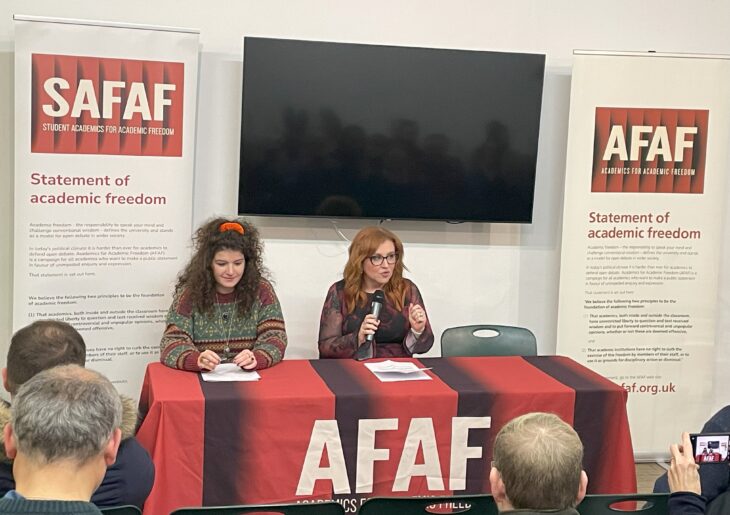
AFAF and SAFAF – The rise of the students
At the AFAF Conference student voices were loud. Many of their stories were subject to Chatham House Rules but here is a snapshot of their contributions. The big message to academics is to find a SAFAF rep in every university – you can do it. Academics and students must work TOGETHER if we are to defend free speech and academic freedom.
“As SAFAF Convenor, I was honoured to speak at the AFAF Conference 2024. SAFAF was borne of my frustrations and self-censorship and speaking with other students I knew they felt the same. Many more did feel the same way and I’m pleased to say SAFAF is now well into double figures for members since its beginning in April 2024, with over 1300 followers on X. Many of our members attended the conference on Saturday 23 November; undergrad and postgrad, first-year and final year. Two of our members also spoke of their experiences and why they joined SAFAF. Every single student who self-censors or worries about being able to freely speak on campus needs the Higher Education (Freedom of Speech) Act to come into being, especially because of the free speech duties on Student Unions.
At the conference we also revealed the SAFAF challenge; we aim to have a SAFAF member in every University in the UK and Ireland. Yes, it’s a big challenge, but we firmly believe the more students speak up, the better; we know there is strength in numbers. We also ask that AFAF members and networks work with us students, help us bring back free speech and academic freedom in our Universities. The only way we can really ensure free speech and academic freedom is to bring academics and students together.
I want every AFAF network member and every branch to start publicising your existence, bring in more colleagues, and show your students that they can speak up too; they have you there in support. We can win this fight by being brave and having each other’s backs”. Heather, University of Glasgow
“The 2024 AFAF Conference offered a profound examination of not only the challenges faced by UK academics in safeguarding their right to free and open debate but also of the steady progress made in the fight to protect academic spaces from opinion-based discrimination. Despite learning of the often-abhorrent treatment endured by members of AFAF and SAFAF from their institutions, I left the conference feeling a renewed sense of optimism—for my own future, for that of my fellow students, and for the broader academic community. In particular, while Professor Abhishek Saha’s compelling overview of HEFOSA’s history underscored that the fight for freedom of thought is far from over, it left me motivated to remain actively engaged with this cause. I now feel inspired as a member of SAFAF to help reshape the academic climate into one where students feel empowered to voice their perspectives without fear of silencing or discrimination.” Lottie, Kings College London
“It was simply brilliant to witness and take part in this year’s AFAF conference. The passion and dedication of both the student and academic branches of the organisation flowed continuously and compellingly; likewise, members spoke eloquently and comprehensively regarding their own experiences and the wider multitude of issues we collectively face in the battle for free expression in academic circles. All those present, audience and orators, were received with the utmost warmth and engagement. Invitingly, we had a healthy combination of new branches and members – myself included – along with multiple AFAF stalwarts. This, combined with the strong regional diversity, placing emphasis on hearing from all corners of the British Isles, made for intriguing discussions in light of the varied cultural-political climates of each nation at this present time. I found the highlight of the event to be its networking potential; many contacts were made within the body (both within my respective university and across Britain), as well as with other free-speech focused organisations during the conference and after drinks.” Jaiden, QMUL
“The AFAF conference was a wonderful opportunity to hear from academics themselves on the topic of freedom of expression in our higher education institutions. It was reassuring not only to know that they feel many of the same frustrations, but to hear about their ongoing and future projects to regain and maintain an atmosphere of freedom to debate, discuss and, crucially, to disagree within a university setting.
I was really pleased to attend as a student representing SAFAF, as conversations between academics and those they teach are a great way to understand the risks posed to both parties by limitations on free expression at universities. Students and academics can truly work together, under the AFAF/SAFAF banners to reinforce how vital it is to protect our right to speak and question freely, perhaps most importantly in higher education institutions.
I met some amazing people, many of whom I am now in touch with via email, and I am excited for the next conference!”. Maeve, University of Bristol
“It was a pleasure to attend and speak at the AFAF conference. Whilst it was so reassuring to be in the company of those who are passionate about protecting freedom in academia, it was a solemn reminder of the dire state of affairs that is higher education. I became a member of SAFAF because from my own experience, university is an echo chamber, and a hostile one at that. It is no environment for a valuable education, and I myself have been excluded from this echo chamber for not conforming. It was a weight off my shoulders to share my own experience with those who have had similar, albeit with much higher stakes.” Connie, University of Leeds
(Phots Credit Ruth Mieschbuehler)


